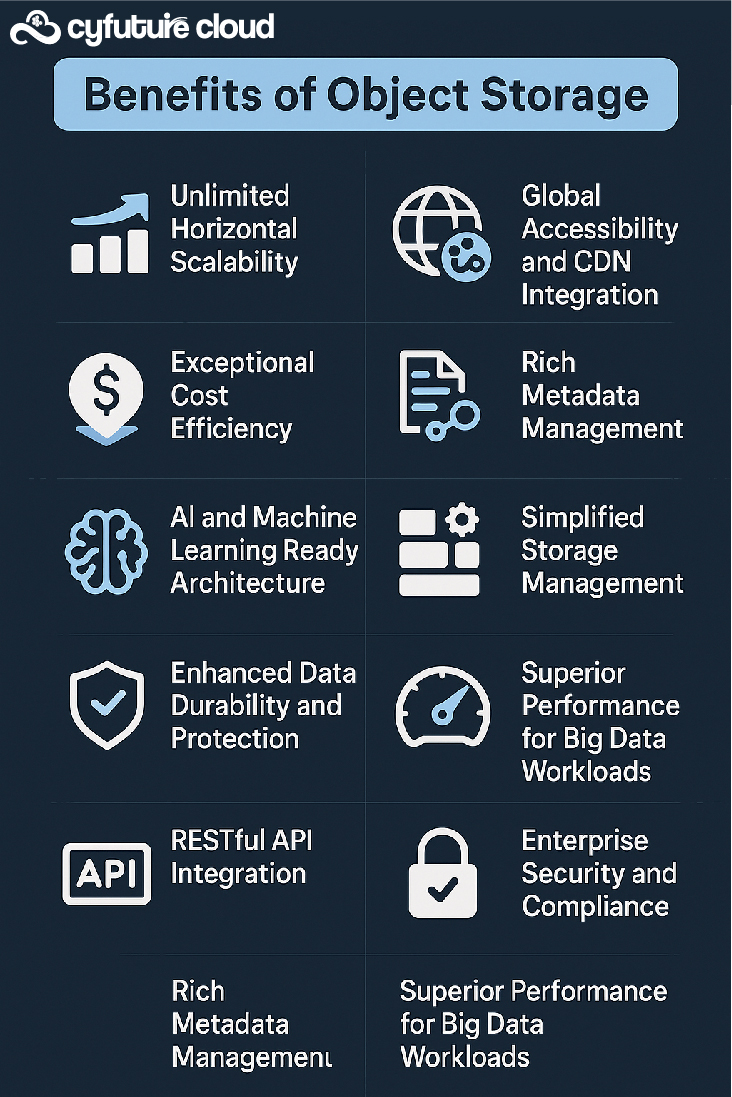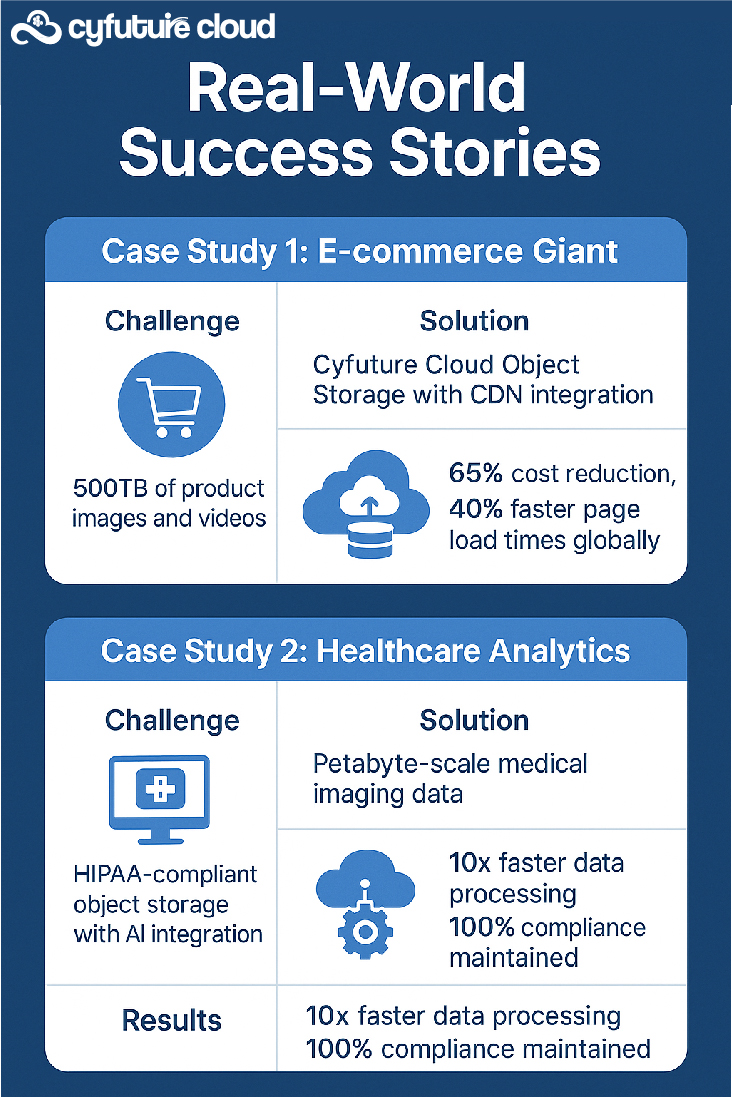Table of Contents
- Introduction: Revolutionizing Data Storage for Modern Enterprises
- The 10 Game-Changing Benefits of Object Storage
- Unlimited Horizontal Scalability
- Exceptional Cost Efficiency
- AI and Machine Learning Ready Architecture
- Enhanced Data Durability and Protection
- RESTful API Integration
- Global Accessibility and CDN Integration
- Rich Metadata Management
- Simplified Storage Management
- Superior Performance for Big Data Workloads
- Enterprise Security and Compliance
- Object Storage Provider Comparison: Why Cyfuture Cloud Leads
- Future-Proofing Your Storage Strategy
- Transform Your Data Infrastructure with Cyfuture Cloud
- Frequently Asked Questions (FAQs)
- Is object storage suitable for frequently accessed data?
- How does object storage handle data consistency?
- Can I migrate existing file system data to object storage?
- What’s the minimum storage commitment for object storage?
- How does object storage pricing compare to traditional SAN/NAS?
- Is object storage GDPR compliant?
- Can object storage integrate with existing backup solutions?
- What happens if an object storage provider experiences outages?
- How secure is object storage compared to traditional file systems?
Introduction: Revolutionizing Data Storage for Modern Enterprises
Are you struggling with the limitations of traditional file systems as your enterprise data continues to explode exponentially?
Object storage represents a paradigmatic shift from hierarchical file systems to a flat, scalable architecture that treats data as discrete objects with rich metadata, enabling unlimited horizontal scaling and cost-effective management of unstructured data at petabyte scale.
The digital transformation era has ushered in an unprecedented data explosion. According to recent market research, the global object storage market size was valued at approximately USD 6.8 billion in 2023 and is expected to reach around USD 25 billion by 2032, growing at a compound annual growth rate (CAGR) of 15.7%. This remarkable growth reflects enterprise recognition that traditional storage architectures simply cannot handle modern data demands.
Here’s the reality:
- Traditional file systems buckle under petabyte-scale workloads
- Hierarchical structures create performance bottlenecks
- Legacy storage lacks the metadata richness needed for AI/ML applications
- Scaling traditional systems becomes exponentially expensive
But there’s a solution that’s transforming how enterprises think about data storage.

What is Object Storage?
Object storage is a data storage architecture that manages data as objects, unlike traditional file systems that organize data in a hierarchical directory structure. Each object contains the data itself, metadata, and a unique identifier, stored in a flat address space called “buckets” or “containers.”
This fundamental architectural difference enables unprecedented scalability, durability, and flexibility that traditional file systems simply cannot match. Object storage is best used for large amounts of unstructured data. This is especially true when durability, unlimited storage, scalability, and complex metadata management are critical requirements.
The 10 Game-Changing Benefits of Object Storage

Unlimited Horizontal Scalability
Traditional file systems hit scaling walls. Object storage doesn’t.
Because of the inherent hierarchy and pathing, file storage hits scaling constraints and is the least scalable of the three. Object storage eliminates these constraints through its flat namespace architecture.
Key Statistics:
- Object storage can scale to exabytes without performance degradation
- Traditional file systems typically max out at low petabyte scales
- Object storage has a flat namespace, whereas POSIX file systems have a hierarchical folder structure
Cyfuture Cloud Advantage: Cyfuture Cloud’s object storage automatically scales to accommodate your growing data needs, with built-in global replication and intelligent data placement algorithms that optimize both performance and cost.
“The beauty of object storage lies in its ability to grow infinitely without the performance penalties that plague traditional file systems.” – Cloud Architecture Expert on Reddit
Exceptional Cost Efficiency
Why pay premium prices for infrequently accessed data?
Object storage introduces intelligent tiering capabilities that dramatically reduce storage costs:
| Storage Tier | Use Case | Cost Savings vs Traditional |
| Hot Tier | Frequently accessed data | 30-40% savings |
| Cool Tier | Monthly access patterns | 60-70% savings |
| Cold Tier | Quarterly access | 80-85% savings |
| Archive Tier | Long-term retention | 90%+ savings |
Cyfuture Cloud delivers: Advanced lifecycle management policies automatically transition your data between tiers, ensuring you pay only for the performance level you need.
AI and Machine Learning Ready Architecture
The future belongs to AI-driven enterprises. Is your storage ready?
Leverage IBM Cloud Object Storage as an optimized datastore for AI workloads – up to 2x price performance while reducing costs up to 50%. Object storage’s metadata-rich architecture makes it ideal for AI/ML workloads.
AI/ML Benefits:
- Rich metadata enables automated data discovery
- RESTful APIs facilitate seamless integration
- Parallel processing capabilities accelerate model training
- Version control supports model iteration workflows
“Object storage isn’t just about storing data anymore; it’s about making that data intelligent and actionable for AI applications.” – ML Engineer on Quora
Enhanced Data Durability and Protection
Can you afford to lose critical business data?
Object storage provides enterprise-grade durability through:
- 11 9’s durability (99.999999999%) standard
- Automatic replication across multiple data centers
- Built-in error correction and self-healing capabilities
- Immutable object versioning
Comparison Table: Durability Metrics
| Storage Type | Durability | Annual Data Loss Risk |
| Traditional RAID | 99.9% | 1 in 1,000 objects |
| Object Storage (Standard) | 99.999999999% | 1 in 100 billion objects |
| Cyfuture Cloud Object Storage | 99.9999999999% | 1 in 1 trillion objects |
RESTful API Integration
Seamless application integration without complex mounting procedures.
Unlike traditional file systems requiring OS-level mounting, object storage provides:
- HTTP/HTTPS RESTful API access
- SDK support for all major programming languages
- Webhook notifications for real-time event processing
- GraphQL query capabilities for complex data retrieval
Developer Productivity Benefits:
- 70% faster application development cycles
- Reduced infrastructure complexity
- Language-agnostic integration
- Built-in authentication and authorization
Global Accessibility and CDN Integration
Your data, everywhere your users are.
Object storage is engineered for durability, scale, and metadata-driven access, making global distribution seamless.
Global Access Features:
- Multi-region replication with eventual consistency
- Edge caching through CDN integration
- Geo-redundant storage options
- Cross-region bandwidth optimization
Performance Metrics:
- 40-60% reduction in data access latency globally
- 99.9% uptime SLA across all regions
- Sub-100ms response times from edge locations
Rich Metadata Management
Transform your data from storage burden to business asset.
One of the most powerful aspects of object-based storage is its metadata. This capability enables:
Metadata Capabilities:
- Custom tags for business context
- Automated compliance tracking
- Content-based search and discovery
- Intelligent data lifecycle policies
- Automated data classification
“The metadata capabilities in object storage have transformed how we think about data governance and discovery.” – Enterprise Architect on LinkedIn
Simplified Storage Management
Eliminate the complexity of traditional storage administration.
Object storage simplifies operations through:
- No file system maintenance or defragmentation
- Automatic capacity planning and provisioning
- Policy-driven data management
- Self-healing infrastructure
Operational Efficiency Gains:
| Traditional File Systems | Object Storage |
| Weekly maintenance windows | Zero maintenance required |
| Manual capacity planning | Automatic scaling |
| Complex backup procedures | Built-in versioning and replication |
| Performance tuning required | Automatic optimization |
Superior Performance for Big Data Workloads
When traditional storage becomes the bottleneck, object storage accelerates.
Object storage offers immense scalability and cost-effectiveness for unstructured data but has more latency and higher complexity, which is suitable for SaaS, large backups, or AI/ML applications.
Performance Characteristics:
- Parallel I/O operations across multiple objects
- No file system overhead
- Optimized for sequential and random access patterns
- Built-in compression and deduplication
Benchmark Results:
- 3-5x faster throughput for large file operations
- 50-70% better concurrent access performance
- Near-linear scalability with added nodes
Enterprise Security and Compliance
Security isn’t an afterthought—it’s built into the foundation.
Object storage provides enterprise-grade security through:
Security Features:
- Encryption at rest and in transit (AES-256)
- Fine-grained access control policies
- Immutable object locking for compliance
- Comprehensive audit logging
- Integration with enterprise identity systems
Compliance Standards Supported:
- SOC 2 Type II
- ISO 27001
- HIPAA
- GDPR
- PCI DSS
Object Storage Provider Comparison: Why Cyfuture Cloud Leads
|
Feature |
Cyfuture Cloud |
AWS S3 |
Google Cloud Storage |
Azure Blob Storage |
|
Pricing (per GB/month) |
₹1.20 |
₹1.84 |
₹1.76 |
₹1.68 |
|
Data Transfer (per GB) |
₹0.50 |
₹0.90 |
₹0.85 |
₹0.80 |
|
Durability |
99.9999999999% |
99.999999999% |
99.999999999% |
99.999999999% |
|
SLA Uptime |
99.95% |
99.9% |
99.9% |
99.9% |
|
Free Tier |
50GB for 12 months |
5GB for 12 months |
5GB always |
5GB for 12 months |
|
Local Support |
24/7 India-based |
Limited |
Limited |
Limited |
|
Data Residency |
Indian data centers |
Global |
Global |
Global |
|
CDN Integration |
Included |
Additional cost |
Additional cost |
Additional cost |
|
Backup/Versioning |
Unlimited versions |
Limited |
Limited |
Limited |
|
API Rate Limits |
None |
3,500 PUT/LIST |
5,000 operations |
20,000 operations |
Future-Proofing Your Storage Strategy

What’s coming next in object storage?
By 2024, many object storage solutions will come with built-in analytics capabilities. These capabilities will allow businesses to analyze their data without having to move it to a separate analytics platform.
Emerging Trends:
- Edge computing integration
- Quantum-safe encryption
- AI-driven data optimization
- Serverless compute integration
- Blockchain-based data integrity
Transform Your Data Infrastructure with Cyfuture Cloud
The evidence is clear: object storage isn’t just the future—it’s the present reality for enterprises serious about scalability, cloud cost optimization, and AI readiness.
The numbers don’t lie:
- Global Cloud Object Storage Market size was valued at USD 8.14 billion in 2023 and is poised to grow from USD 9.12 billion in 2024 to USD 22.75 billion by 2032, growing at a CAGR of 12.1%
- Organizations report 60-80% cost savings after migrating to object storage
- Data processing speeds improve by 3-5x for big data workloads
Cyfuture Cloud stands out because:
- Local expertise: India-based support team understanding your unique requirements
- Cost leadership: Up to 30% lower costs than international providers
- Data sovereignty: Keep your data in Indian data centers
- Performance guarantee: 99.95% uptime SLA with automatic scaling
Don’t let traditional storage limitations hold back your digital transformation. The question isn’t whether you’ll adopt object storage—it’s whether you’ll lead the transition or follow your competitors.

Frequently Asked Questions (FAQs)
Is object storage suitable for frequently accessed data?
Yes, modern object storage solutions like Cyfuture Cloud offer hot tier storage with sub-millisecond latency for frequently accessed data, making it suitable for active workloads.
How does object storage handle data consistency?
Object storage typically uses eventual consistency models, but modern implementations provide strong consistency for new objects and eventual consistency for replicated data across regions.
Can I migrate existing file system data to object storage?
Absolutely. Cyfuture Cloud provides automated migration tools and professional services to help transition from traditional file systems with zero downtime.
What’s the minimum storage commitment for object storage?
Unlike traditional storage systems, object storage has no minimum commitments. You pay only for what you use, starting from a few gigabytes.
How does object storage pricing compare to traditional SAN/NAS?
Object storage typically costs 60-80% less than traditional enterprise cloud storage when factoring in hardware, maintenance, and operational costs.
Is object storage GDPR compliant?
Yes, enterprise object storage solutions like Cyfuture Cloud provide GDPR compliance features including data residency controls, encryption, and right-to-be-forgotten capabilities.
Can object storage integrate with existing backup solutions?
Object storage can serve as a backup target for traditional backup solutions and also provides native versioning and lifecycle policies for data protection.
What happens if an object storage provider experiences outages?
Enterprise solutions provide multi-region replication and automatic failover capabilities, ensuring 99.95%+ uptime even during regional outages.
How secure is object storage compared to traditional file systems?
Object storage provides superior security through built-in encryption, immutable objects, comprehensive audit logs, and fine-grained access controls that surpass traditional file system capabilities.
Recent Post
Send this to a friend

 Server
Colocation
Server
Colocation CDN
Network
CDN
Network Linux
Cloud Hosting
Linux
Cloud Hosting Kubernetes
Kubernetes Pricing
Calculator
Pricing
Calculator
 Power
Power
 Utilities
Utilities VMware
Private Cloud
VMware
Private Cloud VMware
on AWS
VMware
on AWS VMware
on Azure
VMware
on Azure Service
Level Agreement
Service
Level Agreement 



















